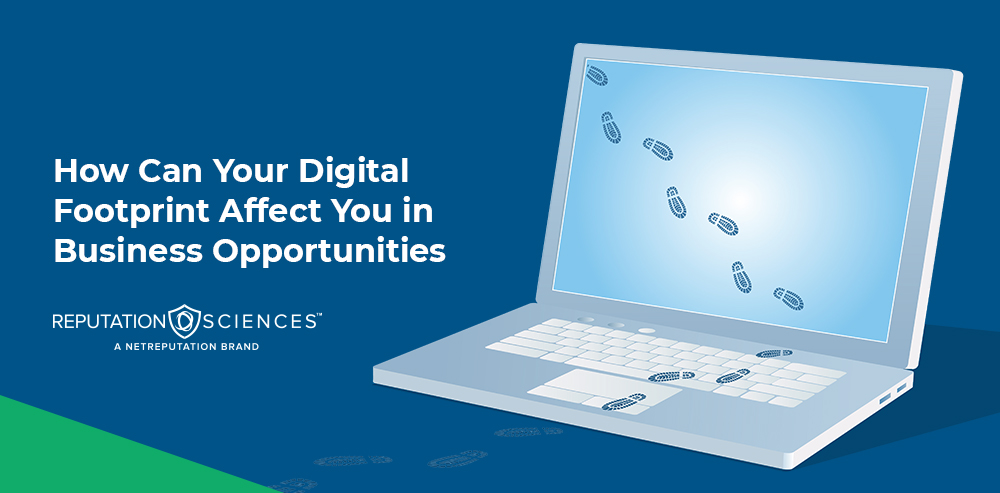How Can Your Digital Footprint Affect You in Business Opportunities?

Your online presence significantly impacts professional opportunities. Employers and business partners scrutinize your digital footprint when making decisions.
This article highlights the importance of managing and improving your digital footprint the risks of a negative online reputation, and offers practical tips for enhancing your digital presence.
What Is a Digital Footprint?
A digital footprint, or digital shadow, is the data trail you leave online through browsing, social media, and online interactions.
It includes active footprints (intentional posts, comments, purchases) and passive footprints (websites visited, cookies, search history).
Understanding these digital trail footprints is vital for managing and protecting your digital reputation and privacy.
The Impact of Your Digital Footprint on Career and Business Opportunities
Your digital footprint is crucial as it affects your online reputation, career opportunities, personal brand, and overall safety and privacy. Employers use your digital footprint to evaluate your job suitability by examining your social media profiles, online behavior, and public information.
They look for consistency between your resume and online presence, assessing professionalism and how you conduct yourself digitally. Similarly, potential business partners analyze your digital footprint to gauge credibility, reliability, and reputation.
They conduct digital audits to validate your professional standing and past collaborations, ensuring your digital persona aligns with real-life accomplishments.
A solid online reputation fosters trust attracts clients, and opens new business opportunities, highlighting the importance of maintaining a positive and active digital footprint.
The Risks and Impacts of a Negative Digital Footprint
A negative digital footprint poses significant risks, including damage to your online reputation, exposure to cyber threats, and adverse effects on personal and professional opportunities.
For job seekers, employers increasingly scrutinize online behavior, and any negative aspects, such as controversial opinions or inappropriate conduct, can lead to doubts about professionalism and suitability for roles.
Similarly, in business, a tarnished online identity can diminish opportunities by undermining credibility and trust. Potential partners and clients often base decisions on online presence, making reputation management crucial.
Proactive steps to maintain a favorable digital presence include monitoring online mentions, addressing negative feedback, and showcasing expertise through positive interactions.
Managing and Improving Your Digital Footprint
Conduct a Search on Yourself
Searching for yourself using search engines like Google is crucial for managing your online reputation. Examine the first few results pages, social media profiles, and public records for negative or outdated information.
Address undesirable content by contacting website owners for removal or using reputation management services. These proactive steps can significantly improve your online perception.
Monitor Your Social Media Presence
Regularly monitoring your social media presence ensures your activity aligns with your desired online identity and professional image.
Update profiles to showcase your expertise, remove inappropriate content, and maintain consistency in messaging across platforms. Utilize social media monitoring tools to access insights into audience engagement and performance.
Be Mindful of What You Post Online
Remembering what you post online is critical for maintaining a positive digital footprint. Consider every interaction an opportunity to contribute positively, avoid sharing sensitive personal information online, and engage in constructive discussions. Thoughtfulness in your online presence projects a reliable and respectful image.
Utilize Privacy Settings
Utilizing privacy settings on your online accounts protects your privacy and controls the visibility of personal data. Adjust settings to manage who can view your posts and contact you. Regularly review and update privacy settings, especially with new account defaults that may expose more personal information elsewhere than intended.
Seek Professional Help if Needed
Seeking professional help from digital auditing companies or cybersecurity experts can be invaluable for managing your digital footprint and online safety.
Experts can identify vulnerabilities, provide reputation management services, and enhance your online presence, ensuring a positive and secure digital image.
What Are Some Examples of Successful Digital Footprints in Business?
Creating a Personal Brand
Creating a personal brand involves defining and aligning your online identity with your career goals to establish a recognizable and trustworthy presence in your industry.
Start by identifying your unique value proposition—what sets you apart and the special skills or experiences you bring.
Share relevant content like blog posts, social media updates, videos, or podcasts to showcase your expertise.
Respond to comments, ask for feedback, and initiate conversations to build strong connections with users and your audience.
Utilizing Social Media for Networking and Promotion
Social media for networking and promotion involves leveraging online platforms to connect with industry professionals, share your work, and promote your brand.
Participate in industry groups on LinkedIn or Facebook to engage with like-minded individuals and expand your network. Share valuable content to showcase your knowledge and expertise, positioning yourself as a thought leader. Engage with influencers to amplify your reach and visibility.
Post updates regularly, engage with your audience, and analyze data to refine your social media strategy for maximum impact.
Showcasing Your Skills and Expertise Online
Showcasing your skills and expertise online through platforms like LinkedIn can significantly boost your career prospects and professional credibility. Create a detailed LinkedIn profile highlighting your accomplishments and experiences.
Share your portfolio work to provide tangible examples of your expertise. Participate in online discussions related to your field to establish yourself as a knowledgeable authority and increase visibility among potential employers or clients.
Consistently demonstrate your skills and knowledge to attract job opportunities and business collaborations.
Building a Positive Online Reputation
Building a positive online reputation requires consistently maintaining a professional digital presence, engaging in constructive online activities, and responding to feedback effectively. Engage positively with your audience by keeping a respectful and friendly tone, promptly responding to queries, and showing appreciation for support.
Address negative feedback proactively and constructively by acknowledging criticism, apologizing if necessary, and offering solutions. Showcase your achievements and milestones to enhance your credibility and trustworthiness.
Share success stories, client testimonials, and industry accolades to highlight your expertise and professionalism. Maintain transparency and consistency in your online activities to manage your reputation effectively.
